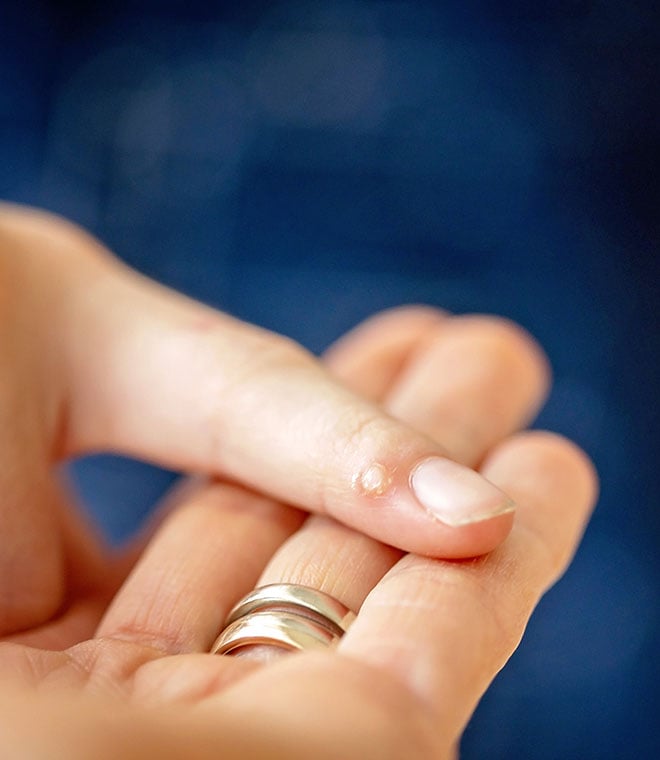Health
Wart removal: What are the options?
By Jenilee Matz, MPH Jan 23, 2024 • 7 min
Warts are caused by a virus, and they're contagious. They're harmless and often go away on their own. Still, they can be aggravating and unsightly, so many people choose to remove them.
Do warts need to be treated?
No, warts don't need to be treated. Warts don't pose a health risk, and they often clear up on their own without treatment, especially in children. However, it can take a year or more for a wart to resolve. If you have warts that are bothersome or spreading, treatment may help them go away faster.
Should you treat a wart on your own?
In some cases, it's OK to try to treat a wart on your own. Other times, it's best to see a dermatologist for treatment. See a dermatologist if you have:
- A growth that looks like it could be something other than a wart; some skin cancers can resemble warts
- Warts that itch, burn, hurt or bleed
- A wart that is growing quickly
- A wart on a sensitive area, such as your face or genitals
- Many warts
- A weakened immune system
- Diabetes. Do not try to remove warts on your feet if you have diabetes; you may accidentally injure your skin, which can lead to permanent nerve damage
How do you treat warts?
There are many ways to treat warts, but there are no established stages of wart removal that you should follow. However, it's common to start with over-the-counter (OTC) wart removal products or home remedies, such as:
- Salicylic acid for warts: Salicylic acid is available in nonprescription and prescription strengths. You apply the medication directly to the wart, and it works by slowly removing layers of the wart over time. Follow the instructions on the package or your provider's instructions carefully. You may need to soak your skin first for a certain amount of time and allow the skin to dry before you apply the wart medicine.
- Freezing for warts or cryotherapy for warts: There are OTC products that freeze a wart off using a very cold substance. Follow the instructions on the product closely to reduce the risk of burning or scarring.
- Duct tape: Using duct tape for wart removal isn't likely to be harmful, but it may not be helpful either. There are claims that applying duct tape to warts helps remove them, but studies have been inconclusive. To try this approach, cover the wart with duct tape for a few days. Then, remove the duct tape, soak the wart and gently remove the dead skin with a pumice stone or emery board. You may need to repeat this process several times. If so, allow the area to dry for several hours before applying duct tape again.
If these remedies don't remove your warts, see your dermatologist for other treatment options. Note that it can take weeks to months for treatments to work. You may need more than one round of treatment for the wart to go away, and it's not uncommon for warts to return later.
How do dermatologists treat warts?
If home treatments don't work, see your dermatologist. The treatment they recommend usually depends on your age and health, the type of wart you have, where it's located and how much it bothers you. Your provider may recommend one or more of the following treatments for common wart, flat wart, genital wart or plantar wart removal:
- Medications: Your treatment may include prescription topical medications you or your healthcare provider apply to your skin. Or, your provider may inject a medication directly into the wart.
- Cryotherapy: Also called wart removal by liquid nitrogen, this is different from OTC cryotherapy. Your healthcare provider applies liquid nitrogen to the wart using a spray or cotton swab.
- Electrosurgery and curettage: This involves burning a wart off. First, your provider does electrosurgery to burn the wart, and then they use curettage to scrape the wart off.
- Surgical excision: Your provider uses special tools to cut out the wart.
- Laser treatment: This involves your provider using an intense light beam to destroy the wart. Laser therapy may be an option for warts that don't respond to other treatments.
Treatments come with the risk of side effects, such as pain, swelling, burning and scarring. Discuss specific side effects with your dermatologist when considering your treatment options.
How to remove genital warts
See your healthcare provider for treatment for genital warts. You shouldn't try to treat them on your own. Genital warts are treated with prescription medications or procedures.
Can you cut off a wart?
A healthcare provider can surgically remove a wart, but you should not try to cut off a wart on your own. You may cut yourself and cause the warts to spread.
While warts often go away on their own over time, there are ways to remove them. If you aren't sure which treatment to try, talk with your healthcare provider. Together, you can find the best wart removal option for you.
Clinically reviewed and updated by Julie McDaniel, MSN, RN, CRNI January 2024.
Sources:
- https://www.aad.org/public/diseases/a-z/warts-overview
- https://www.uptodate.com/contents/cutaneous-warts-common-plantar-and-flat-warts?search=Common%20Wart&source=search_result&selectedTitle=1~150&usage_type=default&display_rank=1
- https://www.mayoclinic.org/diseases-conditions/common-warts/symptoms-causes/syc-20371125#:~:text=Common%20warts%20are%20small%2C%20grainy,and%20are%20transmitted%20by%20touch.
- https://www.aad.org/public/diseases/a-z/warts-self-care
- https://www.health.harvard.edu/diseases-and-conditions/how-to-get-rid-of-warts
- https://www.uofmhealth.org/health-library/hw61500
- https://www.mayoclinic.org/diseases-conditions/plantar-warts/symptoms-causes/syc-20352691
- https://my.clevelandclinic.org/health/diseases/15045-warts
- https://www.uptodate.com/contents/common-warts-plantar-warts-and-flat-warts-beyond-the-basics/print
- https://www.merckmanuals.com/professional/dermatologic-disorders/viral-skin-diseases/warts
- https://www.aad.org/public/diseases/a-z/warts-self-care
- https://www.mayoclinic.org/diseases-conditions/common-warts/diagnosis-treatment/drc-20371131
- https://www.mayoclinic.org/diseases-conditions/plantar-warts/diagnosis-treatment/drc-20352697
- https://www.plannedparenthood.org/learn/stds-hiv-safer-sex/genital-warts/how-do-i-get-treated-genital-warts



